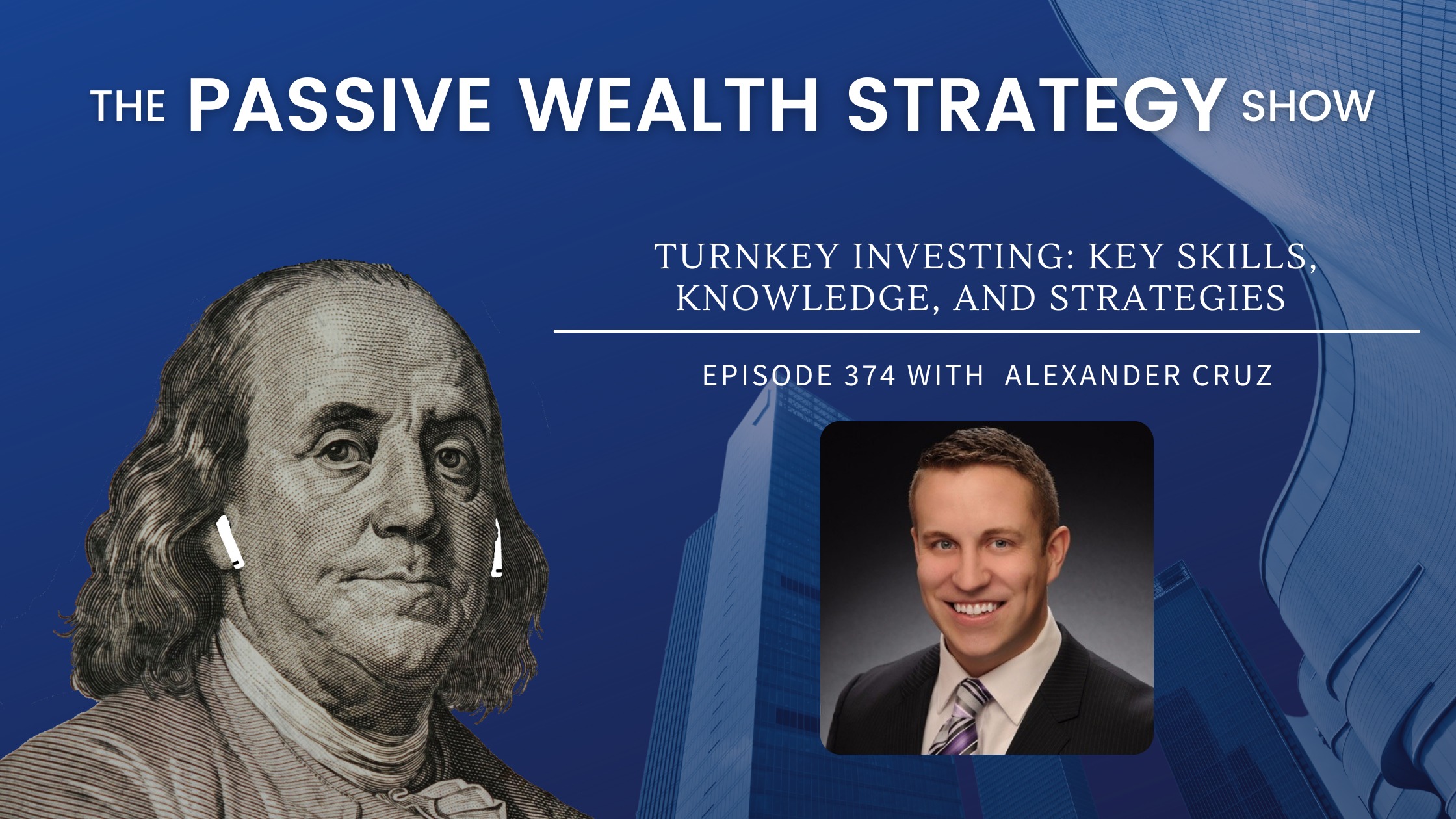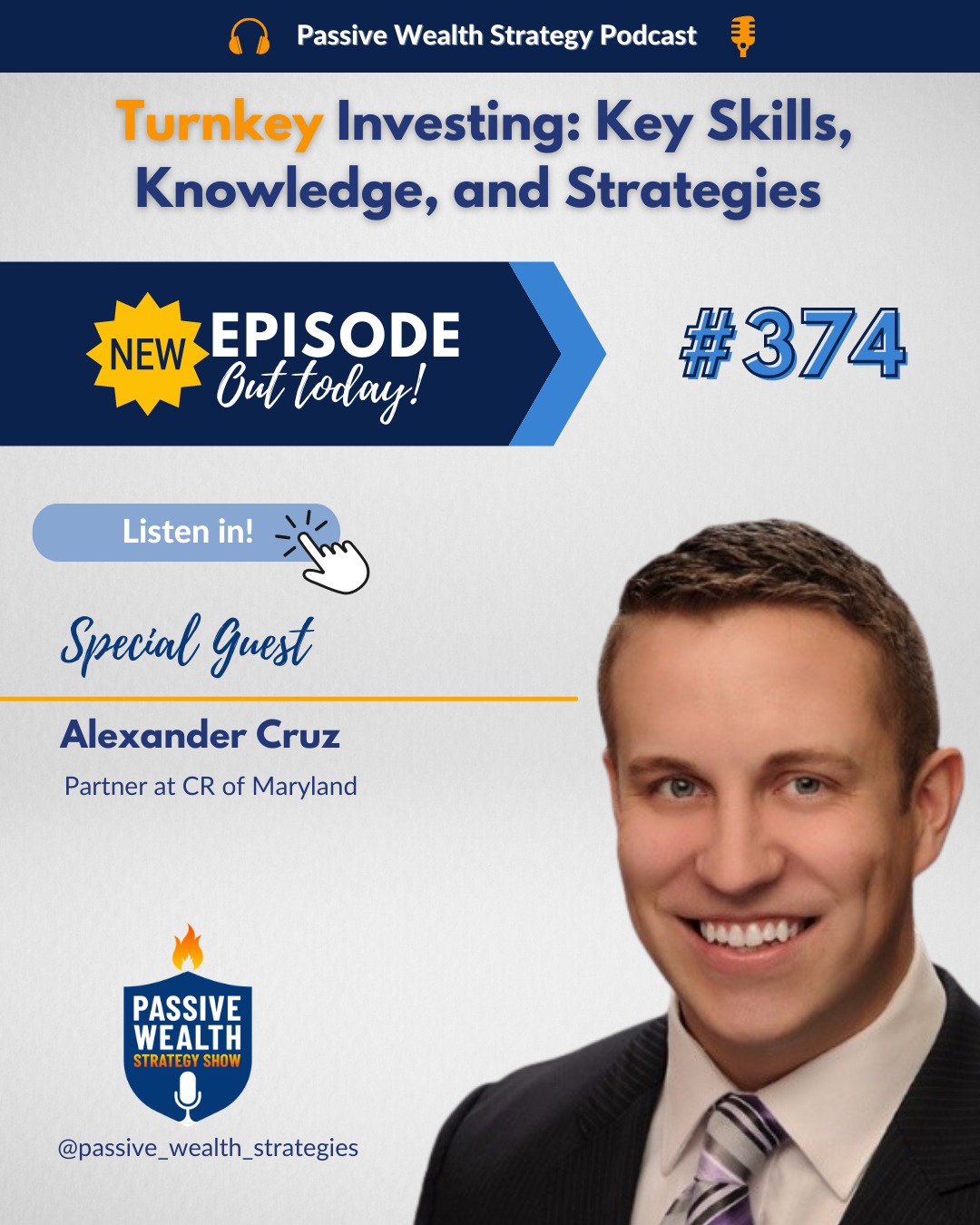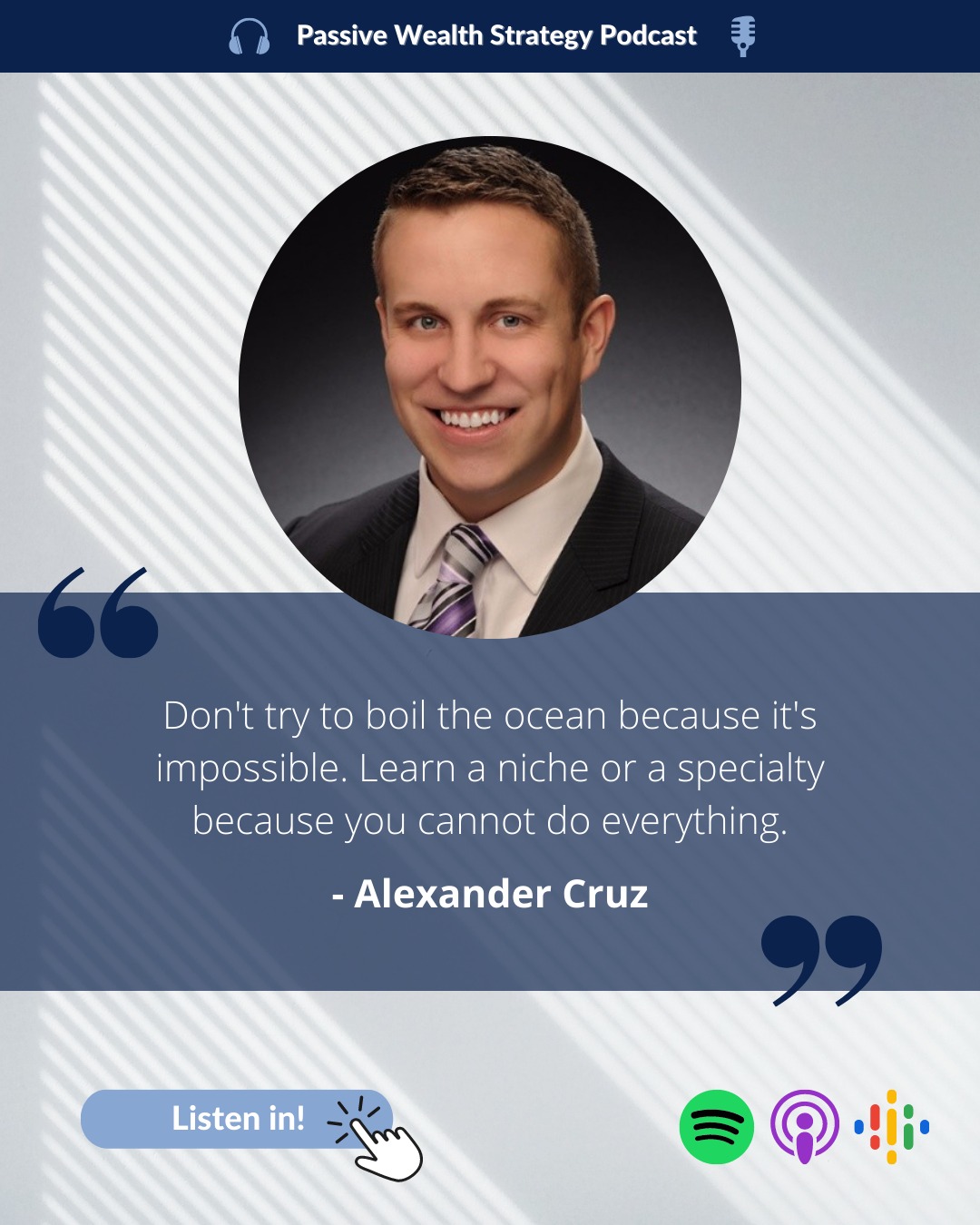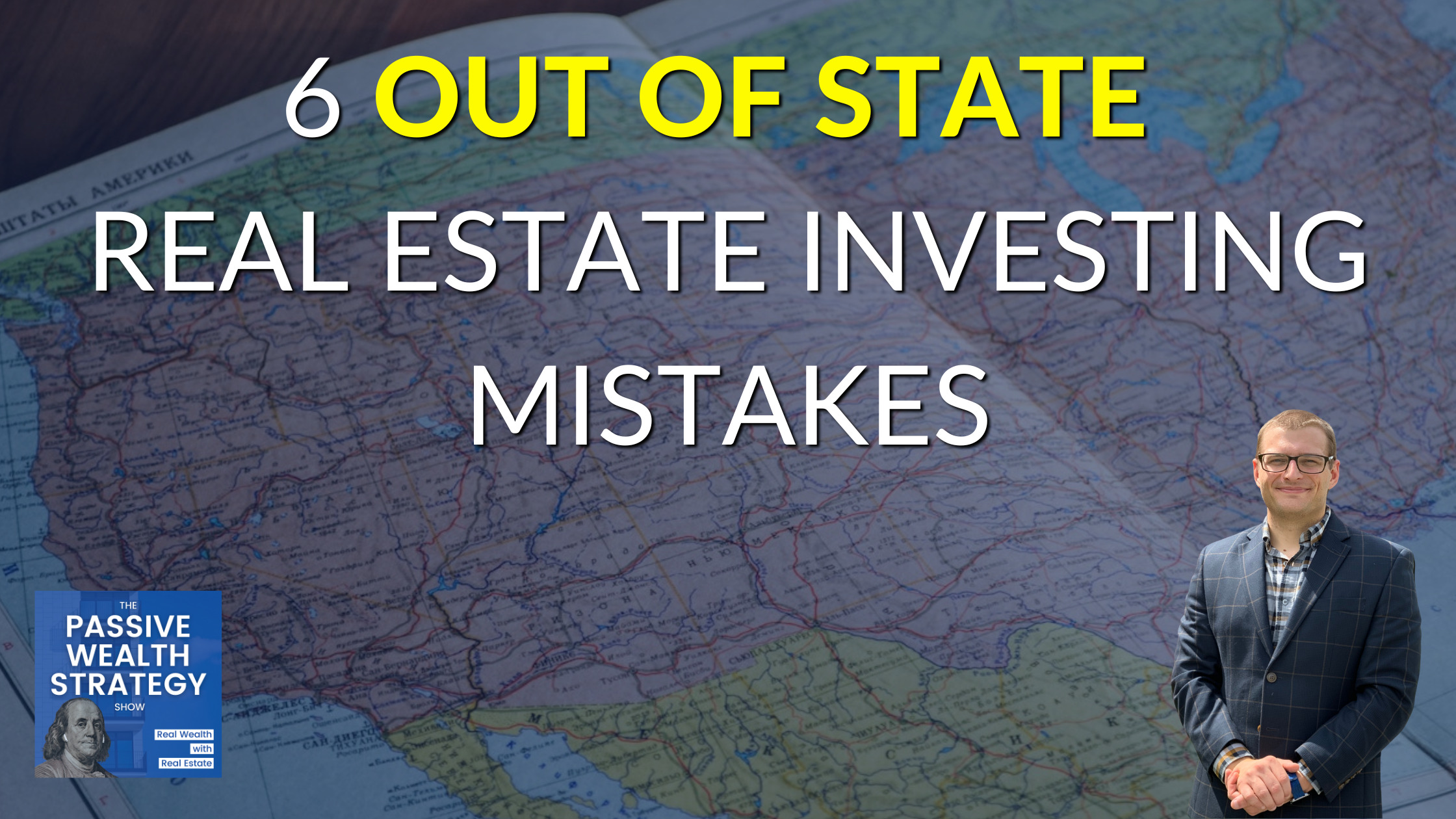
Turnkey Investing: Key Skills, Knowledge, and Strategies with Alexander Cruz
Xander, thank you for joining us today.
Awesome.
Thanks for having me. It’s been a great conversation so far, and I think we’re going to learn a lot of skills and knowledge here around turnkey, real estate investing and for our listeners out there who don’t know about you and your background, can you tell us a bit about what you do, where you are and how you help people invest in.
Sure. So my name’s Zander, I’m born and raised here in Baltimore, Maryland which is where our business is based, and ran our business CR, Maryland. We are primarily a turnkey real estate provider. I have been doing this now for about nine years. My partner has been doing it since 2004. We were.
Historically at a fix and flip company. Then we evolved into building a rental portfolio of about 300 properties in Baltimore. And then after that, we evolved again into becoming a turnkey provider. That’s a long story short, but we provide single-family turnkey properties in Baltimore that we rent out.
Sell to new owners and then we property manage for them.
Nice. Awesome. So I know several folks just through, networking, recording this show, and all the other stuff one does as a real estate investor who invests in Baltimore. And we were talking a bit about this before we started recording the.
Maybe the media narrative or the perception that Baltimore has, it’s where the wire was sad. There’s just negative press, there’s negative press about every city, but people probably have maybe misinformed or misconceptions about Baltimore in general. And can you tell us about the city and then also how maybe more broadly how people can get to, to learn a city in particular and where the good parts to invest are.
And then maybe the less desirable parts are from an investing stance.
Sure. So at a high level, you’re not wrong. Baltimore has gotten a lot of negative press for a variety of reasons. And most of them justifiably. But past that, there’s a ton of really great things happening in Baltimore.
There is a lot of huge business that’s happening, a lot of major investments that are happening. And honestly, it’s somebody recently was talking to me and they called it like the last frontier on the coast. So being a coastal city, all of the other coastal cities have gone extremely well. It is the last.
Little brother, if you will say much between DC and Philadelphia and New York, right along with that corridor. Because of that, I think that is why there is so much investment activity happening here, not just at the residential level, but commercial and industrial in, in really big money corporations, amazon ups, FedEx Johns Hopkins, which seems to be one that everybody knows quality corporation and several others. Beneath the surface, there is a ton of really good people here. There are a lot of jobs here and there’s just a lot going on in multiple different industries. I think the back end of your question was how to learn more about Baltimore in.
Be able to invest here. You’ve got to talk to the locals. Baltimore, if you look at it on a map, doesn’t look that big, but there are a lot of nuances to it. And there are things that you just can’t tell on a map. And you definitely can’t tell by looking at a zip code. It’s one of those cities that is blocked.
So on one side of the street, you could have a great investment. And on the other side of the street, you could fall on your face. So talking to the locals that are in the industry and learning what’s the right fit for a particular investor, cause that’s also subjective and different. And what success is going to look like, that’s how people are going to be successful here.
Okay. Makes sense. And I think, my city Richmond, we can relate to that in some ways that just looking at a map or even a zip code. Isn’t going to give you the real information. And if you speak with someone who lives here or invests here, you could get, much more useful information about where to invest.
And I guess, how do you think about, finding that right person? Because I’ll just, relay it to my case, right? If you just spoke to somebody who has lived in Richmond for, 30 or 40 years, They might not be real and not invest in real estate here. They might not have the most up-to-date information about the market.
So not all information sources are equal. So how do you find that person to talk to? I think that’s a great point because if let me tread carefully and what I say here if I called my uncle who does not invest in real estate and said, Hey, I want to talk to you about investing in Baltimore. He might say, You’re crazy.
Why would you do that? What’s the point. But on the other hand, if you talk to an investor that’s made, I don’t know, millions of dollars investing in Baltimore, they’re going to have a very different perspective. And obviously, they have the experience to back it up. So you know, one of the reasons, one of the draws of Baltimore related to the location and, it has to do with what we talked about earlier, that.
Kind of perception the positive of that as it’s kept price points much more affordable. So that’s why we have a lot of investors come out of DC and from New York that is shopping in Baltimore because it’s so much more affordable than where they live or where they operate. So of course it creates a more competitive environment, that kind of is what it is.
Yeah. That, that is a concern though, that the price shopping, I understand certainly you’re looking for a good deal. Again, just to relate it to Richmond, we see folks coming down from Northern Virginia shoot. They probably come across the border there, of course, Baltimore as well.
Cause they see single-family up there as pushing a million bucks. But down here it’s much more reasonable, but the rents are correspondingly lower and they might not pick the right area. Sure.
Yeah, same concept. It happens up here. One of the nice things about Baltimore, is we do have a really good rent-to-sale price ratio.
Rents are relatively speaking higher here than in other markets. Compared to the sale price over the last two years that has stretched a little bit. The ratios are not as good as they used to be. Rents are catching back up this year, last year in 2021, there was a major rent price spike, and we’ve seen it in areas where we used to rent houses.
I don’t know, $1,300, they’re pushing $1,500 now and all the comps are supporting. So it is, not to get down a rabbit hole, but. Everything that everybody reads in the newest and the inflation and just the way things are increasing in price. We’re seeing it in and in the rental market too.
Absolutely. Yeah. A hundred percent. And valuations, property taxes, all of that is, is going, flying upward. Regarding, the skill set. Okay. We want to find the right areas. We want to talk to locals who know what they’re talking about and track down the people who know what they’re talking about, what others, I want to talk about.
We can talk, certainly to continue to talk about Baltimore. I love that. I love that lens and I want to talk about, skills that turnkey investors need to have regardless of the market they’re investing in. But I think Baltimore is a very interesting case study. So what other skills come to mind from the perspective of a turnkey investor that they need to know before starting to get involved?
I think they, regardless of where you’re going to invest, need to be educated enough to know what are the right questions to ask, what do I need to learn about a potential market? So regardless of if it’s Baltimore or Richmond or Indiana, they need to understand. The market conditions, but they also need to understand what the relationship is going to look like with their turnkey provider and property manager.
For us, that is the same, we do both. But then other markets it’s not the same. You might have an investor that provides you the property, and then you’re going to another company for the management. So understanding that relationship, understanding what their standards are what are there, the risks involved, what.
I’ll say drawbacks of the market. My, I don’t believe there is a perfect rental market or a perfect rental. We’re talking about houses and people. And they’re not, none of the above is perfect. But it’s understanding that risk. And then how are we going to mitigate it in the best way possible?
So how are we going to make sure that our interests are aligned as best as possible? So if I’m a turnkey investor, that’s the conversation that I want to know and understand. And of course the details, like what are the rates and fees? What happens if X, Y, and Z happen? Just understanding all the different scenarios and how you’re a company you’re effectively partnering with, how are going to handle it?
That’s what.
Okay. I like that. The concept of alignment of interest in making sure, we’re on the same page here and right. If everything performs and we both stay out together, if it’s not performing, then you know, we both had an incentive to, to help it improve, are there any examples of ways in which.
Interest could be, misaligned specifically as it relates to a turnkey deal or whether it’s, I don’t know, rent’s not being collected. We had the eviction moratorium shoot. It could be still going on in Baltimore for all. I know. What about things that could be aligned or misaligned?
Do you know what I mean?
The two biggest things for me are probably one being rents and or tenant performance, and then the other being. Repairs and maintenance, especially when you first buy a house. In our case, this is going to be my opportunity to brag a little. We are, we’re doing heavy-duty renovations.
We’re stripping homes down to the studs. We’re running all new electrical, all new plumbing, all new mechanicals, putting them back together. It’s effectively a brand new house, even though it’s an old house with that. Level of renovation. We have confidence in the ability that we are going to warrant that house for the first year.
There are longer manufacturer warranties, but in the first year is where I hear a lot of stories from investors of they’ll say, bought a house over here, different market, different company. And six months in, I ended up putting a roof on, or the water heater failed or the furnace field or the sewer line field, whatever it may be substantial expenses.
I’ve never had an investor have that. Have we had a couple of little incidents, we had one sewer line. I can remember off the top of my head that failed. We paid for it. We gave him a new sewer line. It didn’t cost the owner a dollar. So we’re willing to stand behind the product. The same is true on the tenant side.
When somebody buys a house from us, we place that first tenant at no charge. And then we guarantee that tenant is going to work out if they move out after six. Replace another tenant for free. There’s no charge and we’ll cover the cost of the turnover. So we’re willing to put our skin in the game to say and show, that we believe in what we’re doing.
We believe in the product and the process. And we’re willing to pay for it if it doesn’t go quite right. Historically after the first year, we’re pretty, we’re very well stabilized. We have a high rate of renewal. We do actually. Try to focus on section eight tenants, which historically do stay for a long time.
We, again, have high rates of renewal. We have over six years of experience working with that program in our market. So we’re we know.

Turnkey Investing: Key Skills, Knowledge, and Strategies with Alexander Cruz
And I think going back to the eviction moratorium, I don’t think we have many sections eight tenants in any of my properties, but I would figure that the section eight tenants were much more likely to be paid up than a lot of other tenants.
Would you agree? Disagree? What was your experience here?
You completely agree. We now today have about 340 properties under management. Full disclosure. We sold 260 properties last year that were formerly under our management. So it was a higher number. And when COVID happened and when the moratorium.
We weren’t having issues with our section eight tenants. They, the handful of trouble tenants that we had, were all market tenants. And some of them had performed for years and, life changes, things happen. But it took a long time to get them out of the house, unfortunately.
So yeah, but on the voucher side, section eight is also known as Boucher. Might have had a case where something. Wasn’t paying their water bill and, that’s costing us 50 to a hundred dollars a month, but that’s such a small amount compared to no rent collected for six months or whatever it is.
The stuff like that happened. Absolutely. But again, the risk is much slower and that’s part of what we like about the program.
Nice. So a big question I would have if I were investing in a turnkey rental would be, physical due diligence. If you Google around about any real estate investing strategy, I don’t care what it is.
You’re going to find horror stories, right? There are going to be situations out there. Somebody bought a turnkey rental and the building didn’t even exist. The person was ripped off.
Read that story.
Yeah. No names of people involved, maybe litigious, Google around for yourself. If you don’t believe that.
Regarding that physical due diligence, what are your thoughts about what? A turnkey investor should do. It’s just smart to do. But what should they do? Sure.
Of course, the first thing I would always do is Google. There’s a lot of stuff. Not everything you read on Google may be true, but you’re going to start to at least get a picture painted.
The second thing that I would ask if I was buying in another market is. For a referral or to have another owner to talk to, and speak to another third-party owner and get their experience and what they liked. And didn’t like and then beyond that, you always need to have a home inspection that is done by a third party, obviously should be licensed, needs to be licensed.
And then if you’re financing your lender of course is also going to have a firm appraisal for you. And the lender should also be independent, even if they’re a preferred lender. You’re going to know if it’s a reputable lender. All the lenders we recommend are pretty prevalent. They’re in the turnkey space.
They’re recommended by many networks and other providers. So it’s not like we have a lender in the back of our office, cranking out files. These guys are in a different state altogether, so you can feel that there is some separation and independence there. And they have experience working with us.
That they can support and say, yeah, those guys do a good job and you should be able to ask them, hopefully, whoever you’re considering, they have experience with that provider already. And they can quickly give you a good word or maybe they’ll give you some caution.
Hey, you never know, but that’s the whole point of asking is to see if you’re going to get, caution or, negative feedback.
Okay, shoot. I just forgot the question that I had.
I was going to say that word of mouth. It is. It still works today. Talking to people, just like talking to people in a market that you don’t know, talking to people in this space, this turnkey space it’s a relatively small world.
There are no. 20 turnkey providers in every market. Nothing compared to that, on that level. Talking to other people in the space, they’re going to start to get a feel for who’s doing it the right way.
Nice. I think a big question that I’ve heard people have before, and I think it’s a relevant question.
A, an important question is, okay, no, these are good investments. Why is the turnkey provider not keeping them as our rentals? Why are they fixing them up and then, selling them to someone else and then managing them, if they’re a good deal, why don’t you keep them and just, own them as your rental?
What are your thoughts about that? I’m sure you’ve gotten that question before.
Yeah. And I think it probably depends on who you’re asking. Current personal situation. My business partner is 20 ish years older than me. He now lives in Florida and he’s headed towards retirement. So together we’re not buying any more properties.
On the contrary, we’re working on. Tr transitioning myself to becoming a major city owner of the business. So of course there are expensive things involved in that. So right now my focus is a hundred percent on that not acquiring rentals. And my partner is also, again, headed towards retirement and is not looking to continue to take on more debt.
Everybody’s strategy is different. That being said within a few years, I probably. Absolutely. We’ll be buying more rentals for myself. But there’s a limit if we buy we’ll use last year in 2021 we delivered 190 properties. I couldn’t buy 190, even if I wanted to, it’s just not physically possible.
Which is a great position to be in because as a business, we have grown a lot. But ultimately it’s just impossible for somebody to buy that many deals or properties. So it makes sense. And it just aligns well with our model and the way that we’re structured.
Okay. So presumably you’re using some kind of shorter-term, in money to get the property in the first place and then do the construction and all of that.
And then by bringing in an investor, you get out of that shorter-term money. You make a margin. That’s how businesses work and then you move on to the next. Yep. Absolutely. Okay. Okay. So I do wonder about that shorter-term money. I think I’ve spoken to some people, offline who were more, a hard money lender or type of things that kind of get involved with that.
Is that typically where that shorter-term money is?
In our setup, we were very fortunate that we have a really good banking relationship that was built over many years. So between the banking relationship and with my partner, we’re not using hard money at this point. However, I have seen hard money continue to evolve.
And literally, a week ago I was talking to a local lender and they do rental financing and all kinds of stuff. But they said to me, Hey, by the way, I’ve got a new product coming. That’s going to be hard money in the single digits. And I was like, oh wow. Wow. That’s amazing. So I don’t know how it’s gonna play out because we all hear that rates are about to go up this year.
But it does seem that there’s more money available. Ever is what it feels like. And I remember when COVID first happened, a lot of this rental money, it dd up quick. It was like everybody was holding onto their money and it was hard to find loans. Oh yeah. Now we’re in the opposite space again.
It’s easy to borrow money right now. So I think that’s why the hard money rates have gotten more competitive.
Interesting. So in that same vein though, we’ve still been able to find deals in the commercial world, but we’re competing with other investors, when you’re in a single-family space, you’ve got.
The owner-occupants who are in there. And I’m actually in that space now, cause we’re looking for a new primary residence and it’s insane. I can’t, we’re having a hard time being competitive in a property that, we’re going to live in. We can pay top dollar. I can’t even imagine competing as an investor right now.
Have you been navigated the market with the competition now?
As you said, it’s really hard. And honestly, we spend a lot of money every month marketing to try to find direct sellers. We make a conscious effort to find and build relationships with wholesalers in our market.
So we might get, we might lose out on the deal to another investor that is turning around and wholesaling that deal. And we might still end up buying that house just cautious a little bit more. It happens all the time. So wholesaler is, the easiest way for people to get into real estate and you can do it with basically no money.
There are a ton of wholesale deals happening, at least here. I’m sure in other markets too. It is a good way to buy properties. You don’t have to do the legwork of finding that seller. And by the way, we do wholesale some properties, not a lot but some and, but that’s how a lot of investors are running their business.

Don't try to boil the ocean because it's impossible. Learn a niche or a specialty because you cannot do everything.
Alexander Cruz Tweet
They’re primarily wholesaling. So it’s not a bad way to find properties. You can find wholesalers easily on Facebook, just joined local investment groups and you’ll see wholesalers posting all the time. And Google searches too, obviously, but so we do buy over, over 50% of our homes that we buy. We purchase wholesale.
Oh, okay. Interesting. So over 50% come through wholesalers, you do your eating. Is your eating, badly other, balance or is there a split of other ways that you get properties?
Yeah. So who, leaders, we do our eating. We do still work.
The auctions that that process is low, but we still buy deals that way. And it’s minimal effort. It’s all online now. It’s not like we’re driving around to the auctions. We do still pay attention to the MLS cause every once in a while a deal can be found there. And then relationships that’s is a key aspect.
So relationships with realtors and again, wholesalers are aareot of times the difference between getting a deal and not. What does a relationship mean? Again, for somebody that the lesson, there would be, you always need to obviate people with respect and one deal is never worth burning a relationship.
So respect, honesty, and you got to do what you say you’re going to do. If I, you said, if you sign a contract, you better close. We don’t back out of deals and people know that. Gives us an extra boost in a competitive situation.
Absolutely. And wholesalers, especially productive ones. They have their list of buyers.
And if you burn them, once you’re off that list, you are off. I’ve had to remove people, never fun. It’s not a fun thing.
Nice. On that note right now, we’re going to take a quick break for our spot. All right, Sandra, I’ve got three questions. I ask every guest on the show. Are you? Yes, I’m ready. Great.
First one. What is the best investment you ever made other than in your education?
Sure. So I was thinking about this question and I didn’t want to say something too cliche. So actually I feel. That somebody has had a major impact on our business. Especially the last couple of years has been investing in being in p of a mastermind.
Not just a mastermind, but a real estate investing mastermind. Shameless plug investor fuel is the mastermind that we’re a part of. It’s run by a guy named Mike Cambre. It’s just an awesome group that meets every quarter. They do a lot of online stuff as well. And it’s just a, e of those groups where people up and we learn things that people have.
Experimented with, so we’re not reinventing the wheel. Every time people are like, Hey, this worked for me. Here’s what to do. And we can just plug and play and it reals us advance things much quicker. So again, I’m a big believer in learning from other people. You don’t have to figure everything out on your own.
And it’s an investment and they’re not free, but for me, that’s, it’s really helpful.
I have been in a couple of masterminds myself and the good ones, especially really help everybody get to next the couple steps up in their business. So it can be fantastic in investment had the best investment.
Now we go to the other side of that coin, the worst investment. What is the worst investment you ever.
A? expander: The worst investment I ever made was a, I will say the house number, cause there’s a house there now, but Ellendale drive in town. I bought a house that had a hole in the roof, chicanery a lot of houses with holes in the roof, this hole, however, was.
About six or seven feet in diameter. It had rotted that it had been there for years. It had robbed the house all the way through and oh, by the way, yes, the guy was still living in the house. Wow. We ended up tearing the house down and we were attempting to do construction, which is not our niche.
We know nothing about it. And unfortunately had nobody on our team experienced it. Two years later we sold the lot with nothing. And we had six six-figures on that deal. So it was by far the worst investment I ever made. Had a lot of other great ones in that time, thank God it didn’t, it wasn’t our only one who would’ve put us out of business.
I believe it, I it, but it happens. And I think some folks, I appreciate that. You’re giving us a real and honest answer. I think some folks aren’t willing to admit that an investment has gone wrong and I don’t care what you’re doing in the real estate world.
Do enough deals. Eventually one’s not going to go, unfortunately,
that’s just the way it’s going to happen. You’re going to make mistakes, but.
Got to move forward. My favorite question here at the end of the show is what is the most important lesson you’ve learned in business and investing?
I’m going to give two if that’s okay.
So one from that one I disrupted. I think people need to learn a niche and you can’t do everything. My options guy always says don’t try to boil the ocean cause you can’t. So you got in as you grow, you can do more, but there’s a reason we don’t do new construction. It’s just not what we’re good at.
We’ve grown our rehab business substantially, but we’ve never mentioned any new construction because we just don’t have the people for it. Directly related to that, the other biggest lesson is. then there are challenges of real estate between capital and construction and the competitive market, et cetera.
But we learn this lesson time and time again. People are still our biggest asset. So you got to find good people. And unfortunately, when you don’t have good people, you need to be able to move on from them. Can’t hold on to people that even if they’re nice, if they’re not, if they’re harming your business, it’s just not right.
So you can try to put them in the right seat, but if there’s just no seat for him, you’ve got to move on. But when you have the right people, you got to invest in. u need to nurture that relationship. And you have to make a concerted effort because it’s so easy to get sucked into working on your business all the time that, you’re passing by your important people in the leaf if they don’t feel valued.
People it’,s still a people business. Even if you’re working virtually, it makes it even harder. We realigned with that when our office was shut down in 2020, but. Yeah, that’s super important.
Nice. Those problems can be worked around as long as you’re aware of them and working at them, then, I think that will go a long way.
And thank you so much for joining us today. If folks want to reach out, if they want to get in touch, if they want to learn about, the types of deals that you’re doing in Baltimore or turnkey investing in general or anything like that, where can they track you down?
Sure. So the best place to start on our website, which is CRofmaryland.com. You can also send an email if you’re interested in turnkey directly to a joint inbox that goes to myself and Margaret who runs our turnkey sales. That email is M D [email protected]. Again, the website, if you just Google C R Maryland, you will find us that way too. You can submit a form through the website and we’ll reach out to you.
Awesome. Thank you once again for joining us today and sharing all of this knowledge with everybody out there. Thank you for tuning in. If you’re enjoying the show, please leave us a rating and review on the apple podcast. Five stars. If you don’t mind, guys, I appreciate that so much that helps other people learn about the show, because that helps us rank higher in the apple podcast ecosystem.
And I’m always honest with you guys that gives me a nice little warm and fuzzy feeling because I get to see that you’re engaging with the content and you’re escaping the wall street casino. With us. If you know anyone who could use a little bit more passive wealth in their lives, please share the show with them and bring them into the tribe.
Don’t forget to subscribe, subscribe, and catch us here every Monday, Tuesday, and Thursday. I hope you have a great rest of your day and we’ll talk to you on the next one. Bye-bye
Thanks, Taylor.

Turnkey Investing: Key Skills, Knowledge, and Strategies
About our Guest

Alexander Cruz
Alexander is a Baltimore native who began his Residential Real Estate career in 2011 upon graduating from West Virginia University. ‘Xander’, as he is known, quickly realized a passion for the Residential Investment side of the business.
He worked from the onset with Craig Reich and Brock Reich in developing CR of Maryland into one of the premier Residential Real Estate Companies in Baltimore that now owns and manages over 320 single family rental properties. Over the years, Xander has worn numerous hats and helped oversee each facet of the company through various stages of growth. Today he is the Turnkey Director, working closely with our other Department Managers and directly with our clients.
As a team they ensure that successful relationships are built, top notch service and high-quality product is delivered, and excellent Property Management is the standard. Outside of the office, he resides in Downtown Baltimore with his girlfriend and dog, is an avid Baltimore sports fan and car fanatic.
Episode Show Notes
Alexander is a Baltimore native who began his Residential Real Estate career in 2011 upon graduating from West Virginia University. ‘Xander’, as he is known, quickly realized a passion for the Residential Investment side of the business. He worked from the onset with Craig Reich and Brock Reich in developing CR of Maryland into one of the premier residential real estate Companies in Baltimore that now owns and manages over 320 single-family rental properties. Over the years, Xander has worn numerous hats and helped oversee each facet of the company through various stages of growth. Today he is the Turnkey Director, working closely with our other Department Managers and directly with our clients. As a team they ensure that successful relationships are built, top-notch service and high-quality product is delivered, and excellent Property Management is the standard. Outside of the office, he resides in Downtown Baltimore with his girlfriend and dog and is an avid Baltimore sports fan and car fanatic.
[00:01 – 08:05] Opening Segment
- CR Maryland, Turnkey Real Estate Provider in Baltimore
- Learn a City to Invest In: Let’s get to know Baltimore
- How to Find the Right Local to Ask Your Investing Questions
[08:06 – 15:30] Turnkey Investing: Key Skills, Knowledge, and Strategies
- Good rent to sale price ratio in Baltimore
- Skills Every Turnkey Investor Has to Have
- Alexander talks about the alignment of interest in their properties
- Risks and section eight tenants
[15:31 – 24:32] How to Create Wealth from Turnkey Investing
- Turnkey Investing Physical Due Diligence
- Why Turnkey Investors Opt to Sell their Properties
- Where to Source Short Term Money
- Turnkey Competition and Marketing
[24:33 – 32:56] Closing Segment
- Quick break for our sponsors
- The first step to growing your wealth is tracking your wealth, income spending and everything else about your finances, you can start tracking your wealth for free and get six free months of wealth advisor. Learn more about Personal Capital at www.escapingwallstreet.com
- What is the best investment you’ve ever made other than your education?
- Real Estate Mastermind
- Investor Fuel
- Alexander’s worst investment
- A house with a hole in the roof in Ellendale Dr, Towson
- What is the most important lesson that you’ve learned in business and investing?
- “People need to learn a niche.”
- “People are still our biggest asset.”
Connect with Alexander Cruz through [email protected] and LinkedIn. Visit their website https://crofmaryland.com/.
Invest passively in multiple commercial real estate assets such as apartments, self storage, medical facilities, hotels and more through https://www.passivewealthstrategy.com/crowdstreet/
Participate directly in real estate investment loans on a fractional basis. Go to www.passivewealthstrategy.com/groundfloor/ and get ready to invest on your own terms.
Join our Passive Investor Club for access to passive commercial real estate investment opportunities.
LEAVE A REVIEW + help someone who wants to explode their business growth by sharing this episode or click here to listen to our previous episodes
Tweetable Quotes:
“Talking to the locals that are in the industry, and really learning what’s the right fit for a particular investor, that’s how people are going to be successful in turnkey investing.” – Alexander Cruz
“The turnkey space is a relatively small world. So talking to other people in this space, you’re gonna easily start to get a feel for who’s doing it the right way.” – Alexander Cruz
“Always treat people with respect. One deal is never worth burning in a relationship.” – Alexander Cruz







